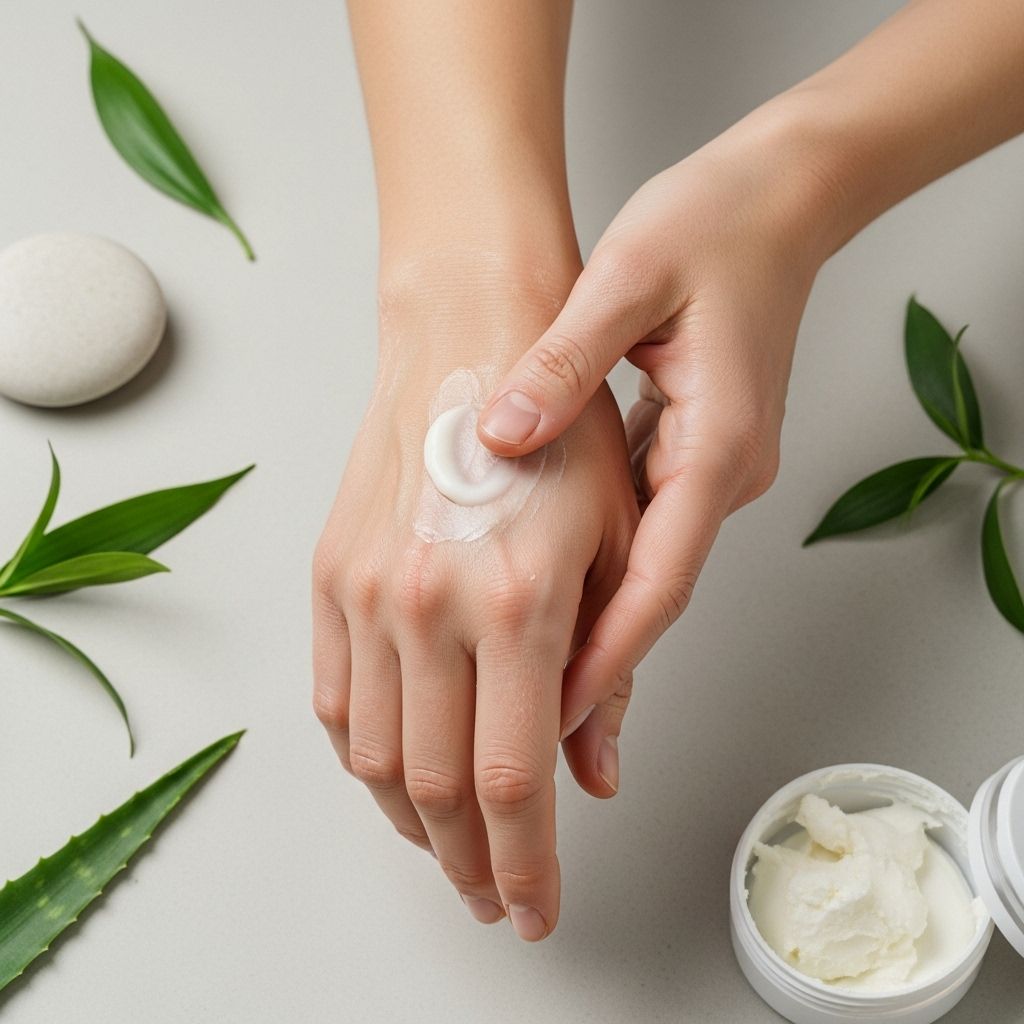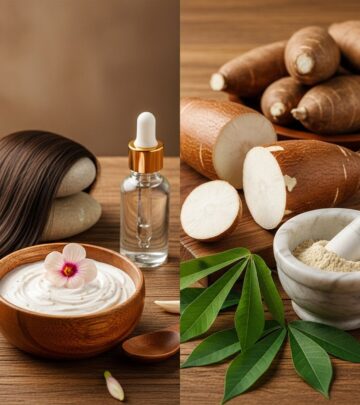Natural Remedies for Dry Hands: Tips, Causes, and Prevention
Discover practical, natural, and easy-to-follow solutions for dry hands—relieve discomfort, improve skin health, and defend against future dryness.

Dry hands affect millions of people each year, especially in colder weather or due to lifestyle factors. The discomfort, roughness, and cracking that result from dry hands can interfere with daily activities, but a wide range of natural remedies and practical habits can restore moisture and protect your skin. This comprehensive guide covers the most effective natural solutions for dry hands, explains common causes, provides prevention strategies, and answers frequently asked questions about hand health.
Understanding Dry Hands
Dry hands occur when your skin loses too much natural moisture. Symptoms include roughness, flaking, cracking, redness, itchiness, and, in severe cases, pain or bleeding. While dry hands are common during winter due to low humidity and cold air, they can also result from frequent hand washing, harsh chemicals, health conditions, or environmental irritants.
Main Causes of Dry Hands
- Weather conditions: Cold temperatures and low humidity dry out the air and skin, especially in winter.
- Frequent hand washing: Repeated exposure to water and soap strips away natural oils that maintain the skin barrier.
- Harsh chemicals or detergents: Cleaning products, hand sanitizers, and occupational exposures can irritate and dehydrate the skin.
- Medical conditions: Skin disorders like eczema, psoriasis, or diabetes are associated with dry hands.
- Other factors: Aging, dehydration, and some medications can also make skin more susceptible to dryness.
Effective Natural Remedies for Dry Hands
Most cases of dry hands can be managed with nonprescription treatments, many of which use natural ingredients and simple daily habits. Here are 17 practical and natural remedies for soothing, hydrating, and repairing dry hands:
1. Use Nourishing Oils
- Coconut oil: Provides deep, lasting hydration due to its emollient properties. Apply directly to clean hands, especially before bed, and cover with cotton gloves for enhanced absorption.
- Olive oil: Rich in antioxidants and has anti-inflammatory benefits. Massage a few drops into dry skin several times a day. Always patch test if you have sensitive skin.
- Baby oil or mineral oil: Locks in moisture and can be applied after washing your hands or bathing. These oils are effective at creating a barrier to prevent further moisture loss.
2. Moisturize Regularly
- Choose thick, fragrance-free moisturizers or ointments designed for very dry skin. Creams with ceramides, shea butter, or glycerin are highly effective for restoring lost moisture.
- Apply moisturizer after every hand wash to replenish moisture.
3. Overnight Hand Treatments
- At night, slather hands with a heavy-duty moisturizer or petroleum jelly (such as Vaseline), then wear cotton gloves or socks. This helps lock in hydration and allows the product to penetrate deeply while you sleep.
4. Oatmeal Soaks and Baths
- Ground oats or oatmeal baths soothe and repair rough, itchy skin. Oatmeal is rich in anti-inflammatory compounds that help restore the skin’s barrier function and relieve irritation.
- To make a soak: Add 1 cup of finely ground oats to a bowl of warm water and immerse your hands for 10–15 minutes.
5. Aloe Vera
- Aloe vera gel offers soothing and healing properties. It is anti-inflammatory and can speed up the healing of cracked skin. Use either pure aloe vera gel from the leaf or a store-bought product with a high aloe content.
6. Honey
- Honey is naturally antibacterial and promotes wound healing. Spread a thin layer over dry patches, cover with a bandage, and leave for at least 30 minutes (or overnight) before rinsing.
7. Milk Soaks
- Milk contains restorative whey proteins and natural fats that nourish and soften the skin. Soak your hands in cool or slightly warmed milk for 5–10 minutes before rinsing gently.
8. Cucumber
- Liquefied cucumber juice replenishes moisture and soothes irritation. Apply the juice or thin slices directly to dry areas for quick relief and a refreshing effect.
9. Petroleum Jelly
- Acts as an occlusive barrier to seal in moisture. Apply a thick layer after washing hands or before bed to help heal cracked or irritated skin.
10. Avoid Overwashing and Hot Water
- Limit hand washing to when necessary. Use lukewarm, not hot, water with a gentle, moisturizing soap. Hot water strips out your skin’s protective oils, increasing dryness.
11. Protective Gloves
- Wear gloves while cleaning, washing dishes, or when exposed to harsh chemicals to prevent further moisture loss and irritation.
- Wear warm gloves when outdoors during winter to shield skin from wind and cold air.
12. Humidifiers
- Using a humidifier at home, especially during dry, cold months, can add much-needed moisture to indoor air and help prevent skin from drying out.
13. Hand Masks
- Apply homemade or store-bought hand masks containing hydrating oils, butters, or honey for extra nourishment. Rinse off according to directions and follow with a moisturizer.
14. Natural Butters
- Shea butter, cocoa butter, or mango butter are rich in fatty acids and antioxidants. Regular application can improve skin elasticity and reduce cracking.
15. Diet and Hydration
- Drink plenty of water throughout the day to maintain skin hydration from within.
- Incorporate foods rich in omega-3 fatty acids (like salmon, walnuts, flaxseeds) to support healthy skin.
16. Avoid Harsh Products
- Use fragrance-free, gentle soaps and alcohol-free sanitizers. Avoid products containing sulfates or other strong foaming agents, which can further dry out hands.
17. Decrease Stress
- Stress can exacerbate conditions like eczema, leading to increased dryness and irritation. Take measures to manage stress (yoga, meditation, regular breaks) for overall skin health.
When to Seek Medical Advice
Most dry hands respond well to natural remedies and supportive care. However, consult a healthcare provider if you notice:
- Severe redness, swelling, or persistent cracks that do not heal
- Signs of infection (like pus or fever)
- Unexplained, ongoing irritation or an underlying medical condition such as eczema or psoriasis
Preventing Dry Hands: Simple Self-Care Tips
Prevention is often the best approach to maintaining healthy skin. Adopt these habits to keep your hands soft and supple year-round:
- Moisturize after every wash.
- Limit use of hot water and harsh soaps.
- Wear gloves when outdoors or cleaning.
- Avoid excessive use of hand sanitizers.
- Hydrate and eat a balanced, nutrient-rich diet.
- Use a humidifier at home during dry seasons.
Table: Comparison of Natural Remedies for Dry Hands
| Remedy | Main Benefits | How to Use |
|---|---|---|
| Coconut oil | Deep hydration, antibacterial | Massage into skin daily; overnight treatment for best results |
| Oatmeal soaks | Soothes, relieves itching | Add ground oats to warm water, soak hands for 10–15 minutes |
| Aloe vera | Reduces inflammation, promotes healing | Apply gel to clean hands and let absorb |
| Honey | Antibacterial, speeds healing | Spread on cracks, cover, and rinse after 30+ minutes |
| Olive oil | Softens, antioxidant-rich | Massage into skin as needed |
| Milk | Restores softness, nourishes | Soak hands for 5–10 min daily |
| Petroleum jelly | Locks in moisture | Apply thickly, especially overnight |
| Cucumber | Refreshes, hydrates | Apply juice or slices to dry skin for several minutes |
Frequently Asked Questions (FAQs)
Q: Why do my hands get dry even when I moisturize?
A: You may be washing hands with hot water or using harsh soaps that strip away oils. Insufficient use of moisturizer or underlying conditions like eczema can also contribute. Use thick creams often and wear gloves for added protection.
Q: Are there any foods I should eat or avoid to help dry hands?
A: Eating foods rich in omega-3 fatty acids (such as fish, walnuts, and flaxseeds), vitamins A, C, and E, and staying hydrated can support skin health. Avoid excessive caffeine, alcohol, and highly processed foods known to worsen dryness.
Q: Can I use common household products to treat dry hands?
A: Yes, items like coconut oil, olive oil, honey, aloe vera, oats, and milk can all be used for natural relief and are often as effective as commercial products.
Q: Is dry skin on hands a sign of a health problem?
A: While most cases are due to weather or lifestyle factors, persistent or severe dryness may indicate eczema, allergies, diabetes, or hypothyroidism. Seek medical advice if your dryness does not improve with self-care.
Q: What should I do if my hands are cracked and bleeding?
A: Apply a healing ointment like petroleum jelly, cover with a bandage, and moisturize regularly. If cracks persist or show signs of infection (redness, swelling, pus), consult a healthcare professional.
Key Takeaways for Softer, Healthier Hands
- Moisturize multiple times daily with thick creams or natural oils.
- Protect hands from cold, chemicals, and hot water by wearing gloves and using gentle cleansers.
- Incorporate overnight treatments and natural soaks to boost hydration and healing.
- Stay hydrated and eat a balanced diet to support skin health from within.
If you adopt these remedies and prevention tips, your hands will remain soft, comfortable, and free of dryness throughout every season.
Read full bio of medha deb











